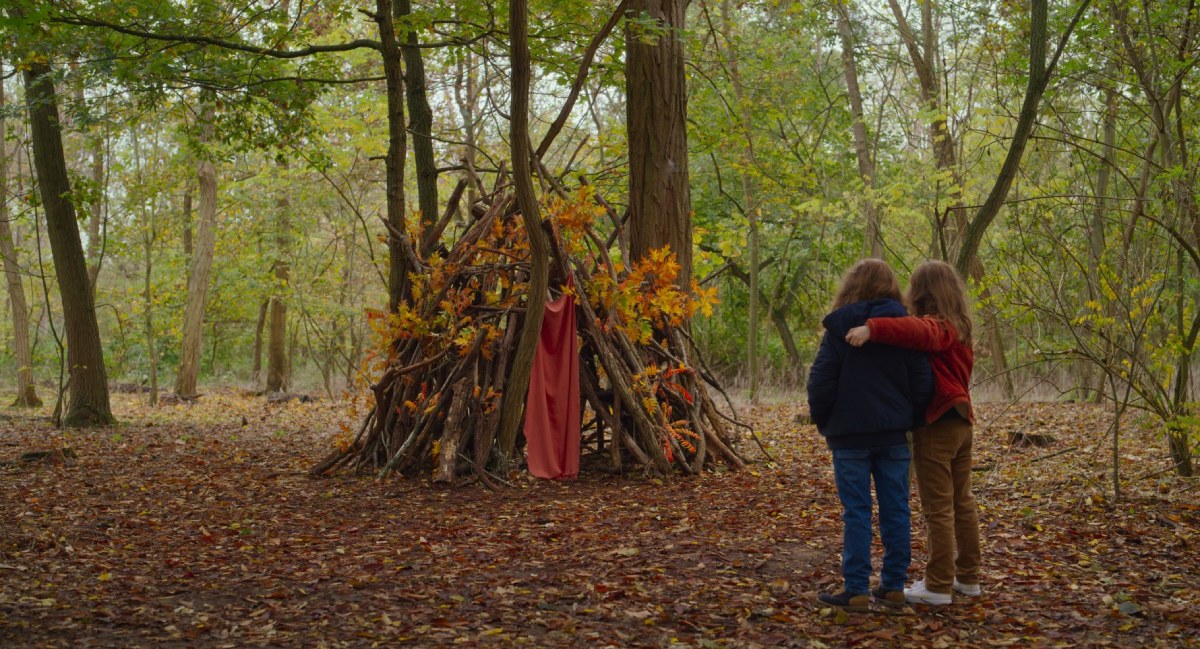There is an unavoidable distance in life between ourselves and those who came before. Parents, grandparents; no matter how open and honest they are with their children or younger relatives, there is a sense that their pasts remain partial enigmas. The young were not there to experience the personalities, the joys, the fears, the relationships of the old. What if you could, however, meet your mother’s younger self and spend afternoons building huts from tree branches and twine, or make pancakes in her childhood home? What if you could experience your mother’s youth with her? These are the questions Céline Sciamma asks in her intimately magical latest feature, “Petite Maman.”
There is melancholy woven throughout the film. Eight-year-old Nelly and her muted, mournful parents are working through the death of her grandmother, clearing out her house and getting rid of old belongings. Yet, Sciamma invites warmth and a restorative glow into the film through dappled, golden light and cozy costume design, aiding a magical realist aesthetic that imbues the film with fantasy and creativity. Autumnal colors and crisp sounds are deployed to great effect particularly in the woods behind the house, Nelly’s mother Marion’s favorite haunt as a child, and the place Nelly is excited to explore. She goes out to find the small hut her mother built years back, and instead is confronted with her mother at the same age Nelly is now, still in the process of constructing it.
The Sanz sisters (Joséphine as Nelly, Gabrielle the young Marion) are assured performers, reserved and coy just enough to prevent any overly saccharine sensibilities as Nelly and Marion become fast friends. The actors share the kind of spark reserved for young siblings, squealing over baking ingredients and divvying up characters to perform in their own play. Joséphine is especially strong in the scenes with Nelly’s parents, quick off the mark with her words of profound comfort and confidence. As Nelly cherishes the time she can share with her new friend, she is also working through her grief in a manner that nourishes and soothes her.
Sciamma’s film is gentle in approach and quiet in tone, a poetic return to the focus on childhood and the anxieties of growing up found in her previous work from “Water Lilies” to “Girlhood.” This film pays special attention to the particular idiosyncrasies of young life too – the way limbs flail, not yet under one’s control, or how children so often wipe away tears or toothpaste with the backs of their small hands, smearing them across their faces. There is also the way Nelly takes small, incremental bites of her snack until it has disappeared into her mouth, the repetitive crunch a small moment of youthful joy. The director balances this simplicity with hugely complex ideas around grief and parenthood, subjects which become no easier to grasp through the eyes of a child but which take on a new kind of perspective and delicate insight.
In many ways, “Petite Maman” feels like a soft interlude of a film, far from the visual and thematic drama of “Portrait of a Lady on Fire” but never attempting to emulate or demand that kind of style. The film is content to tell a simple story in simple terms while letting the more expansive and knotty questions float up and around it – can a parent be truly knowable, and what secrets should we let our kids in on more frequently? Its achievement lies in the space it creates for these children to open up a dialogue they rarely get to have – one that inevitably asks more questions, but that welcomes them as mature thinkers, keen to understand more about those raising them and the conditions in which they are being raised. [B]
You can follow along with the rest of our Berlin Film Festival coverage here.





